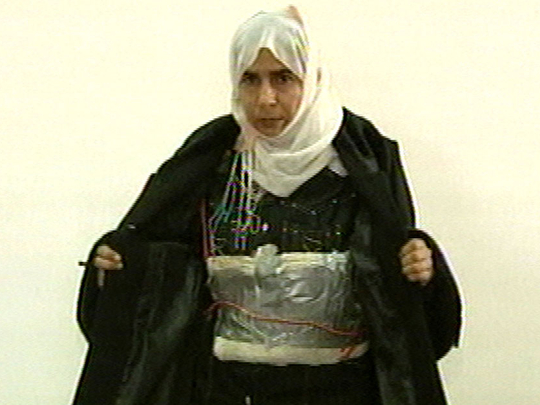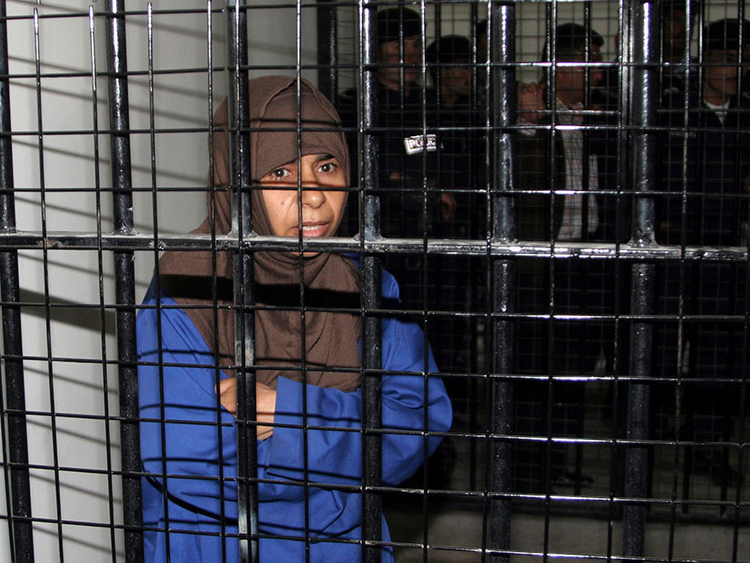
Amman: During the nine years that Sajida Al Rishawi, 46, has been sitting in self-imposed solitary confinement in her cell at the Juweidah Women’s Prison here in Jordan, refusing to mix with other prisoners, she has had hardly any visitors, other than her court-appointed lawyer.
In all that time, Al Qaida in Iraq, which had dispatched her to Jordan to kill, has only rarely mentioned her, especially after that group morphed into Daesh. She was that ultimate embarrassment, the suicide bomber who was unable to complete her mission.
Now Daesh has demanded the release of Sajida, who spent her honeymoon fatally crashing someone else’s wedding, where 27 guests were killed by her newlywed husband after he succeeded in detonating his explosive vest.
Moreover, the Jordanian government agreed Wednesday it was prepared to trade Sajida for the freedom of a Jordanian air force pilot reportedly shot down over Syria last month, becoming the first member of the US-led coalition fighting Daesh to be captured.
Less than a week ago, Daesh had valued two Japanese hostages at $100 million (Dh367.30 million) each. But after killing one of them on Saturday, the group changed its ultimatum: demanding that Sajida be released in exchange for the remaining Japanese man and warning Jordan its pilot, 1st Lt. Muath Al Kaseasbeh, would be killed if she was not released within 24 hours.
That deadline passed Wednesday afternoon without any announcements that Sajida had been released and no word on the two men’s fates.
As the crisis dragged on, the question that baffled Jordanians and terrorism experts alike was, as one analyst put it, “Why Sajida?”
“She has no value whatsoever, no social, no political, no security value whatsoever,” said Linda Maieah, a Jordanian journalist who covers extremists, and who interviewed Sajida in prison, through her lawyer.
“If [Daesh] wanted her, they would have asked for her from the first day,” Maieah said, referring to Daesh. “For nine years, no one ever asked for her. Even her own tribe didn’t care about her.”
Although the reason for the apparent change of heart by the militants remains uncertain, Sajida embodies the evolution of Al Qaida in Iraq to its present incarnation as Daesh.
Sajida was among four suicide bombers who carried out the November 9, 2005, attacks on three hotels in Amman, killing at least 57 people, including those attending the wedding party that she and her newlywed husband, Ali Al Shammari, attacked. Jordanians refer to the attacks as their 9/11.
“She was seen as a dupe, even if she showed no remorse, it’s not like she exuded a lot of ideological energy, none at all, in fact,” said Joost Hiltermann, who is in charge of the Middle East for the International Crisis Group. “People see her as a very lesser person.”
She is so poorly regarded, in fact, that Jordanians, in government and out, seemed to have reached a consensus that Sajida was not worth keeping in prison, when there was the possibility of saving their pilot’s life by releasing her. Jordanian officials have made it clear they would not release her to win only the Japanese hostage’s freedom.
Even Ashraf Al Khalid, the groom at the wedding she attacked, said he and his entire surviving family were willing to see her swapped.
“She’s a nobody; I don’t think she’s very important,” he said. “If it’s 100 per cent sure to get Muath back, we support this, even though I know if she’s released she will probably do this again.”
Al Khalid lost his father in the attack; his wife lost both her parents.
Sajida Al Rishawi hardly came across as much of a firebrand, although she told interrogators she was motivated by vengeance for deaths in her family.
She had been married once before, in her early 30s, unusually late in Al Anbar province in Iraq and among the semi-rural Rishawi tribe she came from. According to Hassan Abu Hanieh, a scholar of Islamist movements, her first husband was a Jordanian member of Al Qaida in Iraq named Abu Anas Al Urdoni, who was killed fighting the Americans in Fallujah in 2003 or 2004.
In rapid succession in 2004, her eldest brother, Thamer, and two other brothers, Yassir and Ammar, were killed by the US military in Anbar province.
Hanieh and Maieah both said it was her eldest brother’s death that most affected her. While she was illiterate and worked at a vegetable stand, her brother Thamer had risen to become a close aide to Abu Musab Al Zarqawi, a Jordanian who led Al Qaida in Iraq. Al Zarqawi appointed Thamer emir of Al Anbar province, Hanieh said.
After the deaths of her brothers, Sajida volunteered for a vengeance mission and was recruited by a cousin early in 2005 for the planned operation attacking hotels in Amman.
A few days in advance, Sajida and Al Shammari were married in Al Anbar. That made it easier for them to travel together and stay in the same safe house, without violating Islamic codes on sexual propriety.
At the Radisson SAS Hotel, they had to ask permission to enter the wedding, saying they were Iraqis and just wanted to see what a Jordanian wedding was like. Then they took up positions on opposite sides of a wedding hall inside the five-star hotel, amid hundreds of guests.
Sajida tried three times to blow herself up but failed, apparently because of a technical fault in her detonator. As guests danced and whooped in the usual fashion of an Arab wedding, Al Shammari climbed atop a table, to give maximum effect to his vest full of high explosives and nails, shouted “Allahu akbar!” and blew up.
Dazed but unhurt, Sajida fled. Still wearing her vest under an overcoat, she took refuge in a distant Jordanian relative’s house. The relative later testified that he discovered the vest under her bed when he bent over to pick up a pomegranate that had fallen on the floor.
After the attack, Al Zarqawi had boasted in a message that one of the suicide attackers had been a woman — apparently he was unaware she had survived. By the next day, she was paraded on television, wearing the vest and confessing.
Maieah, the journalist, said that during the trial she never saw Sajida express remorse — or any other emotion. “Her face was always blank, the same facial expression, no happiness, no sadness,” she said.
While she never spoke out in defence of her actions, she stuck to a refusal to join in reciting verses from the Quran in memory of her victims, when everyone else in the courtroom did so. And when she was sentenced to death, she was overheard telling her lawyer, “Let them either hang me, or send me back to Iraq and I will just blow myself up again.”
Daesh’s recent demand for her release is a reminder that the group is a direct descendant of Al Zarqawi’s Al Qaida in Iraq. Hanieh said that after Al Zarqawi’s death, other leaders came to the fore, including a fellow member of the group’s governing shura, or council, Abu Bakr Al Baghdadi, who is now the leader of Daesh.
“She represents the first generation of Daesh, and one of the first women suicide bombers,” Hanieh said. “That makes her very important to them, and they revere Zarqawi.”
Hiltermann, however, said he would have thought Daesh would have picked more important militants held by Jordan. As many as 60 other alleged Daesh or Al Qaida prisoners are held by Jordan, including Ziad Al Karbouli, who was Al Zarqawi’s top lieutenant at the time of the Jordanian attack and is believed to have helped plan the bombings. Like Sajida, he has also been sentenced to death.
For her part, Maieah said Sajida was “just a malicious, sneaky low-life,” adding that “the only reason she was there is a man couldn’t have gotten into a wedding alone.” Her theory is that the militants are “just doing this to put Jordan in an awkward situation with Japan.”
Japan is a major aid donor to Jordan and has pledged $150 million in aid to help Jordan manage more than 600,000 refugees from Syria whose presence has put a strain on Jordan’s resources and raised the spectre of unrest.
The demand for Sajida’s release has also put Jordan in an awkward situation with its own public, which has been demanding that something be done for Al Kaseasbeh — and complaining that the Japanese journalist should not get precedence. So far, Daesh militants have appeared to promise only to spare Al Kaseasbeh’s life, not to release him, although they have said they would release the Japanese hostage, Kenji Goto, a journalist.
With a growing chorus of Jordanians, led by Al Kaseasbeh’s father, complaining that the US-led fight against Daesh should not be Jordan’s war, some analysts worry that Jordan’s continued participation in the coalition could even be put into question. In that case, Sajida’s extremist supporters may finally have found a use for her — whether or not she gets released.
— New York Times News Service













